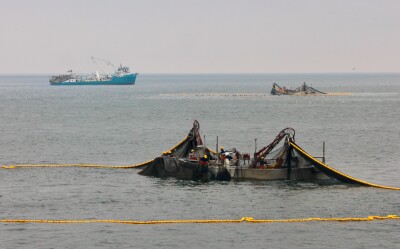When former NMFS director Eileen Sobeck stepped down from her position in January, as the Trump administration moved into the White House and federal agency staffs flipped across the board, she described the changing of the guard at NOAA as a complicated process, but one that the agency would complete with confidence.
“All leadership transitions involve some level of uncertainty,” she wrote in her final letter to NF readers (See Feb. 2017, p. 6). “I can assure you, we are doing everything to ensure this transition process is orderly and smooth.”
Samuel Rauch, deputy assistant administrator for Regulatory Programs, took hold of the agency’s top role as acting director (a role he held for two years after Jane Lubchenco left the agency in 2012) and the search for a permanent leader began.

This feature was first published in the September issue of National Fisherman. Subscribe to the magazine to be the first to read NF cover stories.
But there was no uncertainty from commercial fishing industry stakeholders. As soon as it was appropriate to make recommendations, letters started to pour in from fishing organizations — from Alaska, the Gulf of Mexico and both East and West coast states — all in support of one candidate: Chris Oliver.
“I am incredibly humbled to have received so many letters of support from so many groups — not just from my home states of Alaska and Texas but across the country and across many sectors, both fishing and environmental interests,” said Oliver. “ I’m going to need each of these groups’ help, as well as their candor, in order to succeed in leading NOAA Fisheries.”
In what’s being called an unprecedented show of united support from industry trade associations, seafood companies and conservation groups, stakeholders have agreed that Oliver’s extensive experience in fisheries management and track record were what they wanted at the front of the agency.
“As you will see from his résumé, Mr. Oliver is uniquely suited to this appointment due to his breadth of experience and proven dedication to sound fisheries management,” wrote Marine Conservation Alliance President Lori Swanson in a letter to Trump advisers.
“This decision underscores the leadership and qualifications of Chris Oliver, who has spent his lifetime working to build Alaska and the North Pacific into the gold standard for fisheries management."
— Rep. Don Young, R-Alaska
Originally from Rockport, Texas, Oliver got his start in fisheries management as a research associate at Texas A&M University from 1987 to 1990, where he worked with federal and state agencies on issues in the Gulf of Mexico shrimp fishery. He holds a BBA in business management and a master’s degree in fisheries science, both from Texas A&M.
In 1990, Oliver turned down a fisheries job in Texas, picked up his life and transplanted to Alaska to work as the Gulf of Alaska plan coordinator for the North Pacific Fishery Management Council. Just two years later, he was promoted to deputy director, then again to executive director in 2001.
“The secretary got this one right — it’s the right pick for Alaska and for the country,” said Rep. Don Young (R-Alaska). “This decision underscores the leadership and qualifications of Chris Oliver, who has spent his lifetime working to build Alaska and the North Pacific into the gold standard for fisheries management. Chris’ depth of knowledge and experience, as the head of the North Pacific Fishery Management Council, will bring much needed expertise to a position tasked with addressing some of the most challenging aspects of fisheries management throughout the United States.”
Oliver beat out two other candidates that received notable support.
Former Louisiana Department of Wildlife and Fisheries Secretary Robert Barham received lots of praise from Gulf of Mexico anglers hoping he would come down on their side of the region’s red snapper quota war. Some representatives from the state’s shrimp and menhaden industry sent letters of support as well. Barham’s tenure in that position was scarred when auditors looked into questionable spending in the department between 2010 and 2015.
LaDon Swann, director of the Mississippi-Alabama Sea Grant Consortium and Auburn University Marine Programs, also received significant support for his history of supporting good science and data in fishery management decisions.
But neither stood up to Oliver’s track record with fisherman and hopeful outlook for the future of U.S. fisheries.
"We are extremely supportive and excited about Chris’s appointment because he brings to NOAA Fisheries the skills and experience necessary to effect positive change during the challenging times that lie ahead.”
— Lori Steele, West Coast Seafood Processors Association
“We are extremely supportive and excited about Chris’s appointment because he brings to NOAA Fisheries the skills and experience necessary to effect positive change during the challenging times that lie ahead,” said Lori Steele, executive director of the West Coast Seafood Processors Association.
In a time when more than 90 percent of the seafood consumed in the United States is imported from overseas, the industry is looking for someone who can make regulatory processes work across the board and raise the profile of U.S. seafood.
“Mr. Oliver’s background and credentials are impeccable and make him an ideal choice,” said John Connelly, president of the National Fisheries Institute. “He understands not only the role regions play in sustainability oversight, but has a global perspective on seafood.”
As leader of the North Pacific council, Oliver directed more U.S. fisheries landings than the other council directors combined. In 2015, the North Pacific region accounted for 62 percent of the total U.S. catch. That fact hasn’t escaped fisheries leaders in other regions.
“That region is usually leading the pack and doing the right thing, so it’s good to have someone in that seat that’s known for finding solutions and getting out ahead of problems,” said Bubba Cochrane, president of the Gulf of Mexico Reef Fish Shareholders’ Alliance. “We’ve come a long way since the days of fishing hard and catching very little, especially with red snapper in the gulf. The seafood industry needs someone to protect what we’ve built, keep us from sliding backwards, and make sure the next generation of fishermen like my son don’t have to rebuild these fisheries like we did. Chris is the right guy at the right time.”
Oliver worked in the North Pacific during a great transition period when most fisheries made the switch from derby-style open-access fisheries to limited access catch share programs. He’s noted in many interviews that he’s a strong believer in the regional management system.
"The seafood industry needs someone to protect what we’ve built, keep us from sliding backwards, and make sure the next generation of fishermen like my son don’t have to rebuild these fisheries like we did. Chris is the right guy at the right time.”
— Bubba Cochrane,
Gulf of Mexico Reef Fish Shareholders’ Alliance
“Those who know me and have worked with me know I’m fairly practical, and believe common sense has a greater role in fisheries management. I’m a big believer in streamlining processes and getting the most bang for our buck,” said Oliver. “I believe there are opportunities to provide greater flexibility in applying annual catch limits and in using sound science and innovative management approaches to rebuilding more fish stocks. We can have it both ways.”
Through his longtime participation in the Council Coordination Committee and various international regional fishery management organizations, Oliver is well versed in fisheries issues around the country and around the world.
“What makes sense in the North Pacific… may not make sense in New England, or in the Gulf of Mexico,” he said in a February interview with the Alaska Journal. “I would like to see the agency be more decentralized. It goes hand-in-hand with regional flexibility. It’s a constituent, stakeholder driven process.”
Known to be more of a blunt, apolitical figure in his council role, Oliver has noted he might be a misfit in D.C., but his straightforwardness and commitment to his station’s core mission is what has stakeholders excited for his appointment.
“Mr. Oliver has worked cooperatively with the agency but has also consistently challenged them to make fishery management more responsive to industry concerns,” said Glenn Reed, president of the Pacific Seafood Processors Association. “He has also consistently argued for a more decentralized approach to federal fisheries management by seeking delegation of authorities from Washington, D.C., to the regional offices of NMFS and the regional councils.”
According to early reports, when his name came up in the search, Oliver was planning to retire in the next couple of years and try his hand at consulting. In the end, he decided to make the leap and is looking to make NMFS his career cap.
“I look forward to leading NOAA Fisheries,” said Oliver, “and working with our partners to rebuild U.S. fisheries and conserve and recover protected resources where necessary, promote domestic marine aquaculture production where appropriate, maintain our reputation for world-renowned science and analysis, and do so while maximizing fishing opportunities for the benefit of recreational and commercial fishermen, processors, and the coastal communities which depend on them for generations to come.”







